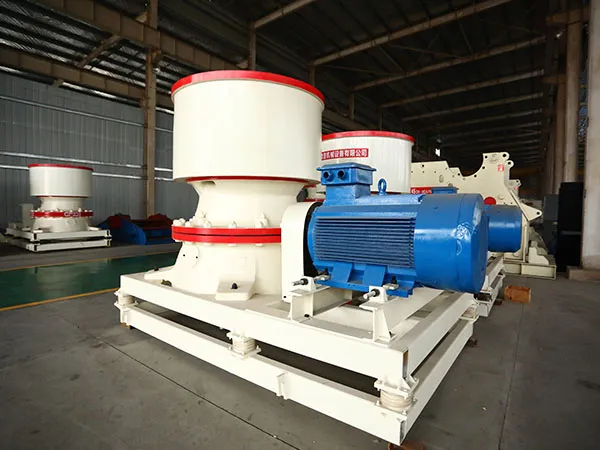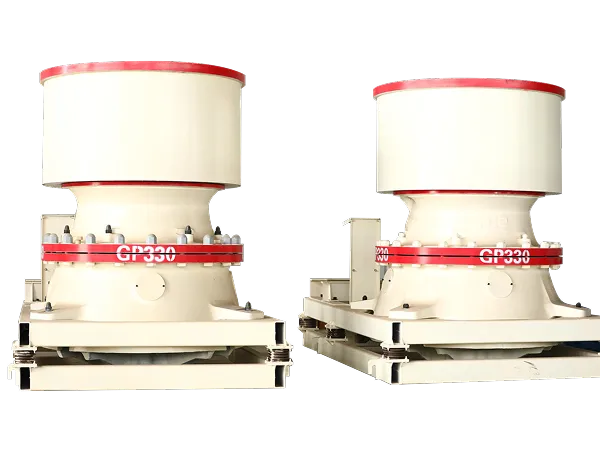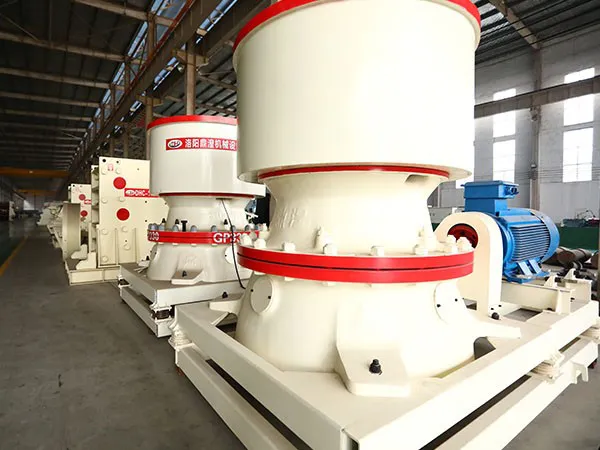Overheating in a cone crusher is a common issue that can lead to significant downtime and costly repairs. It usually indicates an underlying problem that needs to be addressed promptly.

Poor Quality or Insufficient Lubricating Oil:
Cause: Using incorrect oil viscosity, old/degraded oil, or having low oil levels. Contaminated oil (with water, fine mud, or impurities) significantly reduces its lubrication effectiveness and can cause abnormal wear.
Solution:
Regularly check the oil level and top up as needed.
Replace lubricating oil according to manufacturer specifications and maintenance schedules.
Ensure the correct type and viscosity of oil are used for the operating conditions (consider synthetic oil for extreme temperatures).
Analyze fluid samples regularly to detect contaminants and degradation.
Clean the oil tank and replace the oil if contaminated.
Clogged Oil Lines or Cooler:
Cause: Blockages in return pipes, oil grooves, or the cooler itself, leading to poor oil circulation and heat dissipation.
Solution:
Check for blockages in all lubrication lines and the cooler.
Clean the cooler and all tubing/oil grooves thoroughly.
Ensure the cooling water supply is sufficient and at adequate pressure.
Faulty Oil Pump or Safety Valve:
Cause: A malfunctioning oil pump can lead to insufficient oil pressure, while a faulty safety valve can hinder proper oil flow.
Solution:
Inspect and repair or replace the oil pump.
Check and repair/replace the safety valve.
Bearing or Bushing Problems:
Cause: Damaged bearings, insufficient clearance in tapered bushings, worn bowl bearing bushes, or poor contact between the eccentric copper sleeve and the main shaft can generate excessive friction and heat. Overloaded or misaligned bearings also contribute.
Solution:
Inspect and replace damaged bearings.
Overhaul or replace bushings and spindles as needed.
Adjust bushing clearance according to specifications.
Re-scrape contact surfaces to ensure proper fit.
Address any axial play of the countershaft or issues with the upper thrust washer.

Overloading or Excessive Fines in Feed:
Cause: Feeding too much material, or material with a high percentage of fines, forces the crusher to work harder, generating more heat. Tramp iron (non-crushable material) entering the crushing chamber can also cause sudden overloads and blockages.
Solution:
Improve feed conditions to ensure a consistent and appropriate material size and flow rate.
Install proper screening and feeding equipment to prevent oversized material and tramp iron from entering the crusher.
Strictly control the amount of feed.
Improper Crusher Settings:
Cause: Adjusting the crusher to too narrow a setting can increase resistance and heat generation. Incorrect contact between the eccentric shaft and thrust bearing can also lead to overheating.
Solution:
Never adjust the crusher below its minimum gradation setting.
Review and adjust crusher settings according to manufacturer guidelines.
Ensure proper clearance and contact between critical components like the eccentric shaft, copper sleeve, and thrust bearings. Grinding contact surfaces and drilling crack tails can help.
Worn or Damaged Parts:
Cause: Worn out liners (mantle and bowl liner) or other internal components can lead to increased friction and inefficient crushing, resulting in heat.
Solution:
Regularly inspect for wear on mantle, bowl liners, and other critical parts.
Replace worn components promptly.

Excessive Vibration:
Cause: Loose fastening bolts in the base, broken or worn parts, or improper installation can lead to excessive vibration, which generates heat and stresses components.
Solution:
Tighten all bolts and ensure the crusher base is secure.
Check for and replace any broken or worn parts.
Ensure proper alignment of the crusher's components, including the motor and drive system.
Non-uniform Rotation of Transmission Shaft:
Cause: Severe wear or damage to gears, damaged connection keys, or a broken spindle can cause irregular rotation and heat.
Solution:
Replace gears and ensure proper meshing clearance.
Change connection keys.
Replace the spindle if broken.
High Ambient Temperature:
Cause: Operating in a hot environment can exacerbate overheating issues, especially if the cooling system is not adequately designed or maintained.
Solution:
Ensure the cooling system (e.g., air-blast heat exchanger) is functioning optimally and has sufficient capacity for the operating conditions.
Keep the unit heater/cooler clean to prevent clogging.
Preventative Maintenance is Key:
Regular preventative maintenance is crucial to avoid cone crusher overheating:
Daily Checks: Inspect for leaks, unusual noises, vibrations, and check gauges (oil temperature, pressure).
Weekly Checks: In-depth inspection of liners, mantles, pinion shaft lubrication, gear backlash, and seals.
Regular Lubrication: Adhere to manufacturer's lubrication schedule, using the correct type and amount of lubricant. Monitor lubricant levels and quality.
Cleaning: Keep the crusher and its components clean from dust, dirt, and debris that can clog vents or slow down fans.
Monitor Performance: Implement vibration and temperature monitoring systems to detect problems early. Track throughput, energy consumption, and wear rates.
Proper Installation: Ensure the crusher is installed on a stable, level foundation with proper alignment to minimize vibration and stress.
By systematically troubleshooting these potential causes and implementing a robust preventative maintenance program, you can effectively solve and prevent cone crusher overheating problems, extending the lifespan of your equipment and maintaining optimal operational efficiency.
Complete Guide to Sand Washing Machines: Working Principle and Industrial Sand Cleaning
2026-01-28 00:58How to Adjust Water Flow in a Sand Washing Machine: A Comprehensive Practical Guide
2026-01-23 01:29Sand Washing Machine Installation Guide: Step-by-Step Instructions for Optimal Performance
2026-01-15 06:46How Much Does a Sand Washing Machine Cost? A Practical Buyer’s Guide for 2026
2026-01-09 04:37Address: Luoyang Luoxin Industrial Park, Henan,China
E-mail: sales@yd-crusher.com
Phone: 86-139-3993-0123

Yude
Mechanical
Create the greatest value for customers
Provide the best quality products and services
86-139-3993-0123
sales@yd-crusher.com
Luoyang Luoxin Industrial Park, Henan,China